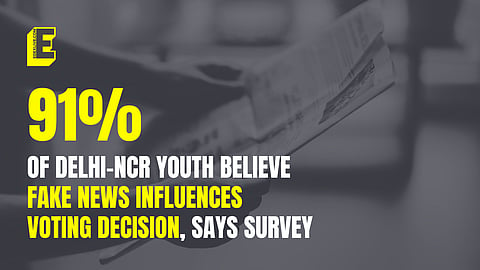

According to a recent survey, 91 per cent of young people in Delhi-NCR think that fake news can affect people's decisions to vote ahead of time, and 80 per cent of those surveyed said that fake news changed their ideas and perceptions about a public figure or event.
The 23 Watts, a communication consultancy company surveyed 1,200 people in Delhi-NCR between the ages of 17 and 25 for the Truth Be Told survey. The survey looks at how Gen-Z views, absorbs and deals with the complexity of misinformation, reports PTI.
Additionally, it illuminates the social media habits, perspectives, and information-sharing patterns of Delhi's youth, demonstrating the influence these elements have on their decision-making.
According to the report, 62 per cent of respondents believe that fake news not only misleads perceptions but also serves as a tool for influencing reputation.
Public figures and politicians account for the vast majority of fake news online, with religion coming in third, respondents believe.
On misinformation
On the topic of misinformation, a staggering 57 per cent of respondents claimed to have been duped by fake news concerning politicians and public figures, while 15 per cent received inaccurate forwards and religious news.
Technology and crime are a close fourth and fifth on the list, with 14 per cent of respondents receiving bogus news concerning each.
The scenario is not entirely bleak, as 95 per cent of Gen-Z respondents said that they try to authenticate news through fact-checking websites, by examining the source, discussing it, and evaluating the tone.
However, despite the claim of validating material, 45 per cent of respondents admitted to sharing unverified news that was later discovered to be false.
When asked who is responsible for the propagation of disinformation, 46 per cent of respondents seized the higher ground and claimed blame. While 37 per cent blamed the media, 17 per cent criticised the government for failing to handle fake news.
A staggering 89 per cent believe that the government can do more "if it so wishes" to combat fake news.
About 69 per cent backed tighter laws and sanctions to deal with fake news, while 16 per cent believed an awareness campaign would be beneficial. Moreover, 15 per cent of respondents believe that establishing a national fact-checking mechanism is the solution.
